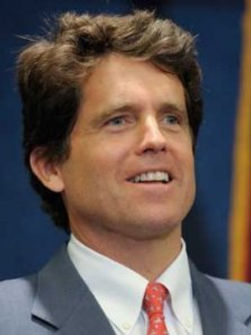
Mark Shriver, author of “A Good Man: Rediscovering My Father, Sargent Shriver.”
Mark Shriver Writes About A Good Man
by Ronald Sklar
Mark Shriver writes a book about his dad, Sargent Shriver, first director of The Peace Corps and avid letter writer.
Mark Shriver recently published a memoir about his father, called A Good Man, [Henry Holt & Company] shortly after Sargent’s death from Alzheimer’s disease in 2011, at age 95.
Sargent Shriver was the first director of The Peace Corps and The Jobs Corps, among other organizations that helped people around the world escape poverty. He was also instrumental in President Johnson’s War on Poverty during the Sixties, as well as a driving force behind the Head Start program, which provides comprehensive education and nutrition to lower-income children.
Mark took his dad’s inspirational lead. He heads up the US division of Save the Children, which promotes children’s rights, providing relief and support for children in developing countries.
It’s also easy to see from his looks and from his commitment to public service that he is a Kennedy. His mother is Eunice Kennedy Shriver (President Kennedy’s sister), who died in 2009. Together with her husband, they brought to life The Special Olympics, which thrives to this day. Mark’s sister is Maria Shriver.
Here, we discuss Sargent Shriver’s imprint on the conscience of a generation, as well as what Mark has learned from this good man.
Your dad helped so many people and yet remained humble. What was his driving engine?
I think it was just the way he saw life. There wasn’t any moaning about the past, worrying about his legacy. Somebody said to me, “This book is a great legacy for your dad.” It kind of threw me back, because I never thought about it. He never thought about his legacy, like “I need to name a building after myself.” I think it’s because he ultimately saw his work in the public sector and the private sector as a way to do the best he could with the gifts that God had given him. I know that sounds a bit old fashioned or maybe goofy, but that’s the way he operated.
He was a genuinely happy man.
He had a wonderful relationship with my mom. These were two really trailblazing people who had a marriage of 56 years. I knew he went to mass on a daily basis. I knew he had a ton of friends, and that people thought that he was special.
In this digital age, it actually seems quaint to learn that your dad was a dedicated letter writer.
He wrote me letters all the time, and I figured, “Oh, I guess everybody does that with their kids.” I realize that that’s not true. I thought everybody went to mass everyday and developed a relationship with God and then I realized that’s not true. I think the book really helped me pull all of those thoughts together.


Comentarios